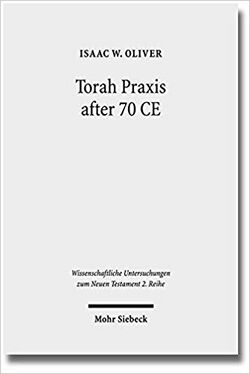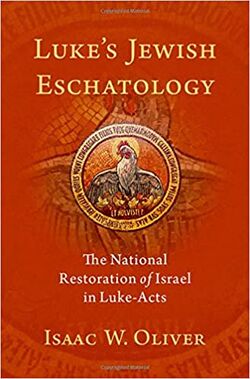Difference between revisions of "Isaac W. Oliver (b.1980), scholar"
| Line 1: | Line 1: | ||
[[File:Isaac W. Oliver.jpg|thumb|250px|Isaac W. Oliver]] | [[File:Isaac W. Oliver.jpg|thumb|250px|Isaac W. Oliver]] | ||
[[File: | [[File:2013 Oliver.jpg|thumb|250px|2011]] | ||
[[File:2021 Oliver.jpg|thumb|250px|2021]] | [[File:2021 Oliver.jpg|thumb|250px|2021]] | ||
| Line 7: | Line 7: | ||
== -- 2010s -- == | == -- 2010s -- == | ||
==== Isaac W. Oliver, ''[[Torah Praxis after 70 CE: Reading Matthew and Luke-Acts as Jewish Texts (2013 Oliver), book]]'' (Tübingen, Germany: Mohr Siebeck, | ==== Isaac W. Oliver, ''[[Torah Praxis after 70 CE: Reading Matthew and Luke-Acts as Jewish Texts (2013 Oliver), book]]'' (Tübingen, Germany: Mohr Siebeck, 2013) ==== | ||
:"Many consider the gospel of Matthew to be one of the most "Jewish" texts of the New Testament. Luke-Acts, on the other hand, has traditionally been viewed as a very "Greek" and Gentile-Christian text. Isaac W. Oliver challenges this dichotomy, reading Matthew and Luke-Acts not only against their Jewish "background" but as early Jewish literature. He explores the question of Torah praxis, especially its ritual aspects, in each writing. By assessing their attitude toward three central markers of Jewish identity - Sabbath, kashrut, and circumcision - Oliver argues that both Matthew and Luke affirm the perpetuation of Torah observance within the Jesus movement, albeit by differentiating which Mosaic commandments are incumbent upon Jewish and Gentile followers of Jesus. Luke proves to be just as "Jewish" as his cousin Matthew in so far as his affirmation of the Mosaic Torah is concerned. The evidence in both Matthew and Luke-Acts suggests that Jewish practices such as the Sabbath and even circumcision continued to enjoy a prominent status in the Jesus movement even after 70 CE, and that Jewish followers of Jesus played an important and integral role in the formation of the ekklesia well throughout the latter third of the first century CE."--Publisher's description. | :"Many consider the gospel of Matthew to be one of the most "Jewish" texts of the New Testament. Luke-Acts, on the other hand, has traditionally been viewed as a very "Greek" and Gentile-Christian text. Isaac W. Oliver challenges this dichotomy, reading Matthew and Luke-Acts not only against their Jewish "background" but as early Jewish literature. He explores the question of Torah praxis, especially its ritual aspects, in each writing. By assessing their attitude toward three central markers of Jewish identity - Sabbath, kashrut, and circumcision - Oliver argues that both Matthew and Luke affirm the perpetuation of Torah observance within the Jesus movement, albeit by differentiating which Mosaic commandments are incumbent upon Jewish and Gentile followers of Jesus. Luke proves to be just as "Jewish" as his cousin Matthew in so far as his affirmation of the Mosaic Torah is concerned. The evidence in both Matthew and Luke-Acts suggests that Jewish practices such as the Sabbath and even circumcision continued to enjoy a prominent status in the Jesus movement even after 70 CE, and that Jewish followers of Jesus played an important and integral role in the formation of the ekklesia well throughout the latter third of the first century CE."--Publisher's description. | ||
| Line 15: | Line 15: | ||
== -- 2010s -- == | == -- 2010s -- == | ||
==== Edited volume -- Isaac W. Oliver / Gabriele Boccaccini, ''[[The Early Reception of Paul the Second Temple Jew (2018 Oliver, Boccaccini), edited volume]] | ==== Edited volume -- Isaac W. Oliver / Gabriele Boccaccini, ''[[The Early Reception of Paul the Second Temple Jew (2018 Oliver, Boccaccini), edited volume]]'' ==== | ||
------ | ------ | ||
==== Isaac W. Oliver, ''[[Luke's Jewish Eschatology: The National Restoration of Israel in Luke-Acts (2021 Oliver), book]]'' ==== | ==== Isaac W. Oliver, ''[[Luke's Jewish Eschatology: The National Restoration of Israel in Luke-Acts (2021 Oliver), book|Luke's Jewish Eschatology: The National Restoration of Israel in Luke-Acts]]'' (Oxford: Oxford University Press, 2021) ==== | ||
:"Luke, the eponymous author of the gospel that bears his name as well as the book of Acts, wrote the largest portion of the New Testament. Luke is generally thought to be a gentile. This book addresses a question raised by Jesus's disciples at the very beginning of Acts: "Lord, will you at this time restore the kingdom to Israel?" The question is freighted with political and national significance as it inquires about the restoration of political sovereignty to the Jewish people. This book investigates Luke's perspective on the salvation of Israel in light of Jewish restoration eschatology. It situates Luke-Acts in the aftermath of the destruction of the Second Temple in 70 CE. The author of Luke-Acts did not write the Jews off but still awaited the restoration of Israel. Luke conceived of Israel's eschatological restoration in traditional Jewish terms. The nation of Israel would experience liberation in the fullest sense, including national and political restoration. Luke's Jewish Eschatology builds upon the appreciation of the Jewish character of early Christianity in the decades after the Holocaust, which has witnessed the reclamation of the Jewishness of the historical Jesus and even Paul."--Publisher description. | |||
:"Finally, a volume that appreciates Luke's ongoing interest in the salvation of the Jewish people, continuing concern for the promises to David, and both the particularistic and universalistic implications of Jewish theology. Oliver offers not only a brilliant corrective to the anti-Jewish implications of much of Luke-Acts scholarship but also an engagingly written, fully documented historical analysis." -- Amy-Jill Levine, Mary Jane Werthan Professor of Jewish Studies, Vanderbilt University | |||
:"Isaac Oliver presents a powerful and well-substantiated reading of Luke-Acts as a Jewish text where the restoration of Israel as a collective and concrete event is never out of sight. Luke-Acts is seen as expressing eschatological hopes for all Israel and all creation, that is, explicitly Jewish hopes for the universal dimension of God's intervention. Isaac Oliver convincingly argues that the resurrection of the Davidic Messiah Jesus is not the climax of this intervention but a stage in the eschatological events, with all Israel and all of creation living in hope and anticipation of what is still to come. An indispensable reading for scholars and students alike, this study paves a substantial pathway for further conversations over interpretations of these first century texts of Jewish tradition." -- Kathy Ehrensperger, University of Potsdam, Germany | |||
:"What Isaac Oliver did for Luke's legal reasoning in his 2013 Torah Praxis after 70 CE, he now does for Luke's eschatology in this excellent book: He makes sense of it within the Judaism of that crucial period between the destruction of the temple and the ascendancy of the rabbis. Oliver shows how Luke-Acts, despite its manifestly being a piece of Graeco-Roman literature, speaks fluently the language of ancient Jewish restoration eschatology. A welcome addition to a conflicted field of research." -- Matthew V. Novenson, University of Edinburgh | |||
==Varia== | |||
*[[Wisdom Poured Out like Water: Studies on Jewish and Christian Antiquity in Honor of Gabriele Boccaccini (2018, Ellens, Oliver, von Ehrenkrook, Waddell, Zurawski), edited volume]] | *[[Wisdom Poured Out like Water: Studies on Jewish and Christian Antiquity in Honor of Gabriele Boccaccini (2018, Ellens, Oliver, von Ehrenkrook, Waddell, Zurawski), edited volume]] | ||
Revision as of 17:21, 7 December 2021
Isaac W. Oliver/ de Oliveira (b.1980) is an American-Brazilian Jewish scholar. 2012 PhD in Near Eastern Studies at the University of Michigan, where he studied with Gabriele Boccaccini. Currently assistant professor at the Department of Philosophy and Religious Studies of Bradley University (Illinois, USA). Is the chief editor of the Reviews of Enoch Seminar Online, and member of the board of directors of the Enoch Seminar.
-- 2010s --
Isaac W. Oliver, Torah Praxis after 70 CE: Reading Matthew and Luke-Acts as Jewish Texts (2013 Oliver), book (Tübingen, Germany: Mohr Siebeck, 2013)
- "Many consider the gospel of Matthew to be one of the most "Jewish" texts of the New Testament. Luke-Acts, on the other hand, has traditionally been viewed as a very "Greek" and Gentile-Christian text. Isaac W. Oliver challenges this dichotomy, reading Matthew and Luke-Acts not only against their Jewish "background" but as early Jewish literature. He explores the question of Torah praxis, especially its ritual aspects, in each writing. By assessing their attitude toward three central markers of Jewish identity - Sabbath, kashrut, and circumcision - Oliver argues that both Matthew and Luke affirm the perpetuation of Torah observance within the Jesus movement, albeit by differentiating which Mosaic commandments are incumbent upon Jewish and Gentile followers of Jesus. Luke proves to be just as "Jewish" as his cousin Matthew in so far as his affirmation of the Mosaic Torah is concerned. The evidence in both Matthew and Luke-Acts suggests that Jewish practices such as the Sabbath and even circumcision continued to enjoy a prominent status in the Jesus movement even after 70 CE, and that Jewish followers of Jesus played an important and integral role in the formation of the ekklesia well throughout the latter third of the first century CE."--Publisher's description.
- Series : WUNT, 2:355.
-- 2010s --
Edited volume -- Isaac W. Oliver / Gabriele Boccaccini, The Early Reception of Paul the Second Temple Jew (2018 Oliver, Boccaccini), edited volume
Isaac W. Oliver, Luke's Jewish Eschatology: The National Restoration of Israel in Luke-Acts (Oxford: Oxford University Press, 2021)
- "Luke, the eponymous author of the gospel that bears his name as well as the book of Acts, wrote the largest portion of the New Testament. Luke is generally thought to be a gentile. This book addresses a question raised by Jesus's disciples at the very beginning of Acts: "Lord, will you at this time restore the kingdom to Israel?" The question is freighted with political and national significance as it inquires about the restoration of political sovereignty to the Jewish people. This book investigates Luke's perspective on the salvation of Israel in light of Jewish restoration eschatology. It situates Luke-Acts in the aftermath of the destruction of the Second Temple in 70 CE. The author of Luke-Acts did not write the Jews off but still awaited the restoration of Israel. Luke conceived of Israel's eschatological restoration in traditional Jewish terms. The nation of Israel would experience liberation in the fullest sense, including national and political restoration. Luke's Jewish Eschatology builds upon the appreciation of the Jewish character of early Christianity in the decades after the Holocaust, which has witnessed the reclamation of the Jewishness of the historical Jesus and even Paul."--Publisher description.
- "Finally, a volume that appreciates Luke's ongoing interest in the salvation of the Jewish people, continuing concern for the promises to David, and both the particularistic and universalistic implications of Jewish theology. Oliver offers not only a brilliant corrective to the anti-Jewish implications of much of Luke-Acts scholarship but also an engagingly written, fully documented historical analysis." -- Amy-Jill Levine, Mary Jane Werthan Professor of Jewish Studies, Vanderbilt University
- "Isaac Oliver presents a powerful and well-substantiated reading of Luke-Acts as a Jewish text where the restoration of Israel as a collective and concrete event is never out of sight. Luke-Acts is seen as expressing eschatological hopes for all Israel and all creation, that is, explicitly Jewish hopes for the universal dimension of God's intervention. Isaac Oliver convincingly argues that the resurrection of the Davidic Messiah Jesus is not the climax of this intervention but a stage in the eschatological events, with all Israel and all of creation living in hope and anticipation of what is still to come. An indispensable reading for scholars and students alike, this study paves a substantial pathway for further conversations over interpretations of these first century texts of Jewish tradition." -- Kathy Ehrensperger, University of Potsdam, Germany
- "What Isaac Oliver did for Luke's legal reasoning in his 2013 Torah Praxis after 70 CE, he now does for Luke's eschatology in this excellent book: He makes sense of it within the Judaism of that crucial period between the destruction of the temple and the ascendancy of the rabbis. Oliver shows how Luke-Acts, despite its manifestly being a piece of Graeco-Roman literature, speaks fluently the language of ancient Jewish restoration eschatology. A welcome addition to a conflicted field of research." -- Matthew V. Novenson, University of Edinburgh
Varia
Articles
Isaac W. Oliver and Veronika Bachmann. “The Book of Jubilees: An Annotated Bibliography from the First German Translation of 1850 to the Enoch Seminar of 2007.” Henoch 31.1 (2009): 123–64.
“Simon Peter Meets Simon the Tanner: The Ritual Insignificance of Tanning in Ancient Judaism.” New Testament Studies 59.1 (2013): 50–60.
“Forming Jewish Identity by Formulating Legislation for Gentiles.” Journal of Ancient Judaism 4.1 (2013): 105–32.
“Jewish Followers of Jesus and the Bar Kokhba Revolt: Re-examining the Christian Sources.” Pages 109–27 in The Psychological Dynamics of Revolution: Religious Revolts. Vol. 1 of Winning Revolutions: The Psychology of Successful Revolts for Freedom, Fairness, and Rights. Edited by J. Harold Ellens. Praeger, 2014.
“Jewish Apocalyptic Expectations during and after the Revolts against Rome.” Pages 129–38 in The Psychological Dynamics of Revolution: Religious Revolts. Vol. 1 of Winning Revolutions: The Psychology of Successful Revolts for Freedom, Fairness, and Rights. Edited by J. Harold Ellens. Praeger, 2014.
“The ‘Historical Paul’ and the Paul of Acts: Which Is More Jewish?” Pages 51–71 in Paul the Jew: A Conversation between Pauline and Second Temple Scholars. Edited by Carlos A. Segovia and Gabriele Boccaccini. Fortress, 2016.
“Messianic Jews and the Early Jewish Followers of Jesus,” Hebrew Studies Journal 57 (2016): 201–209.
“Matthieu est-il plus juif que Luc?” Judaïsme ancien/Ancient Judaism 5 (2017): 109–145.
Isaac W. Oliver and Gabriele Boccaccini, “Introduction,” Pages 1–10 in The Early Reception of Paul the Second Temple Jew. Edited by Isaac W. Oliver and Gabriele Boccaccini. London: Bloomsbury T&T Clark, 2018.
“The Calling of Paul in the Acts of the Apostles,” Pages 179–91 in The Early Reception of Paul the Second Temple Jew. Edited by Isaac W. Oliver and Gabriele Boccaccini. London: Bloomsbury T&T Clark, 2018.
“Are Luke and Acts Anti-Marcionite?” Pages 499–525 in Wisdom Poured Out Like Water”: Studies on Jewish and Christian Antiquity in Honor of Gabriele Boccaccini’s 60th Birthday. Co-edited with J. Harold Ellens, Jason von Ehrenkrook, Isaac W. Oliver, James Waddell, and Jason Zurawski. Berlin: De Gruyter, 2018.
I. W. Oliver, J. H. Ellens, J. von Ehrenkrook, J. Waddell, and J. Zurawski, “Enoch and Beyond: Reflections on the Scholarship of Gabriele Boccaccini.” Pages 1–12 in Wisdom Poured Out Like Water”: Studies on Jewish and Christian Antiquity in Honor of Gabriele Boccaccini’s 60th Birthday. Berlin: De Gruyter, 2018.
“Luke’s Eschatology and Genealogy in Light of Enochic Tradition,” in The Early Enoch Tradition and the Synoptic Gospels. Edited by Loren T. Stuckenbruck, Gabriele Boccaccini, James H. Charlesworth, and Matthias Hoffmann. Jewish and Christian Texts 224. London: Bloomsbury T&T Clark, 2019.
“The Historical-Critical Study of Jewish, Christian, and Islamic Scriptures,” in Early Islam: The Sectarian Milieu of Late Antiquity? Edited by Guillaume Dye. Late Antique and Medieval Islamic Near East. The Oriental Institute of the University of Chicago. proofs submitted; forthcoming (2020).


